|
Lake Valley
was a town few people had every heard of until 1878. That was
the year a blacksmith named John Leavitt took a lease on a claim
and two days later discovered the most fabulous lode of silver
the world has ever known. Called the "Bridal Chamber",
it was a hollow in the hillside with walls of solid horn silver.
Before it was all over, a spur from the railroad was extended
into the "Bridal Chamber" and ore deposited directly
into the ore cars. Total production from the "Chamber"
was close to $2,775,000. Worthy of note is the name of George
W. Lufkin who together with a partner owned the claim on which
Leavitt later discovered the "Chamber". They sold the
claim to the Sierra Grande Mining Company for $100,000 who in
turn leased a portion to Leavitt who discovered the "Bridal
Chamber". Lufkin, the first discoverer of silver in the
area, died penniless and is buried in the Lake Valley cemetery.
Submitted by Henry Chenoweth.
Lake Valley,
first called Daly, is named for ancient lake beds nearby. It
was founded with the discovery of silver n the area in August
1878 by George ufkin, who sold out to George Daly.
The town moved twice before settling
at its present site in 1882 when the Bridal Chamber Mine (in
Lufkin's original claim) was discovered by blacksmith John Leavitt.
The walls of the subterranean mine were lined with silver so
pure it was shipped unsmelted to the mint. The strike produced
2.5 million ounces of silver, including one chunk, featured at
the 1882 Denver Exposition, valued at $7,000 (when silver sold
for $1.11 an ounce.) The mine manager was killed by Apaches a
few days after the discovery.
A stage stop and railhead, Lake
Valley grew to 4,000, with 12 saloons, three churches, two newspapers,
a school, stores, hotels, stamp mills and smelters. The 1893
silver panic wiped it out and a fire destroyed main street in
1895. The post office closed in 1954 and the last residents left
in 1994. The Bureau of Land Management watches over the town-site
today and has set up a walking tour. The schoolhouse, built in
1904, is open to the public. A chapel and some old homes and
railroad buildings still stand. Courtesy Michael Cook.
HI I have an update on a New Mexico ghost town called Lake Valley.
The ghost town is closed on Tuesdays and Wednesdays. The gate opens at 9am and closes
at 4pm.
There is a caretaker there 24/7. He lives behind the school. If you want to see the school
you have to ring the buzzer and he will come out and let you in.
There are no buildings that you can go inside to see. The BLM sign says that
they are looking to open all the building up at sometime but no date has been
set as to when the buildings will be open.
The best part of Lake Valley is owned by the mining companies and they have
a KEEP OUT, sign by the gate. You cannot get in to see the RR Depot or several
of the mines and old houses. The gate sign reports that it is way to dangerous to
get into this area. I think this was the best part of the town to see but only from a
distance.
Thanks. Hope this helps.
Bobby Sargent
Deming NM
The article on Ghost towns and Lake Valley, NM in the Travel section of the Sunday, Oct. 26 issue of the Arizona Republic brought back a few memories.
In 1919/20, my mother Helen Gehl was a school teacher at Lake Valley. At that time my father, Harvey Yocum was the Station Agent for the AT&SF at Nutt, NM. They had courted when she attended New Mexico State Teachers College in Silver City and he was the RR Freight Agent there. They secretly married in 1920 and my mother went to Hockett, a railroad section house, and was the teacher there. Later they moved to Hatch,NM, El Paso, TX and finally back to Silver City.
Just inside the front door of the school house, immediately to the left, on the wall, was a photograph of my mother. The building was used for several years as a gathering place and dances were held for the local ranchers. - Jerry Yocum
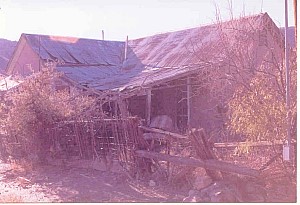
Old Houses
Courtesy Bobbye and Speedy Drake

Old Houses
Courtesy Bobbye and Speedy Drake
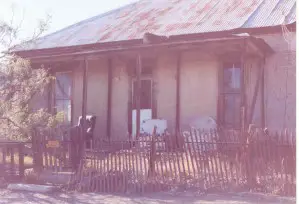
Old Houses
Courtesy Bobbye and Speedy Drake
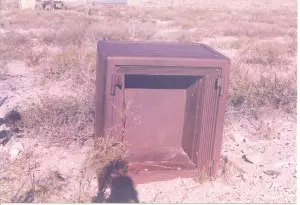
Old Safe
Courtesy Bobbye and Speedy Drake
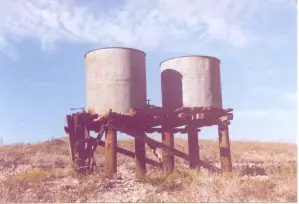
Water Tower
Courtesy Bobbye and Speedy Drake
|
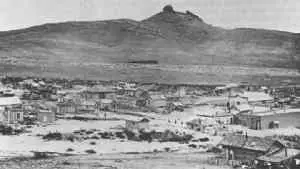
Lake Valley, 1890
Courtesy Schmit Collection, University of New Mexico Library
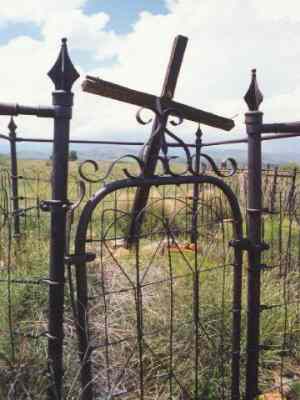
Lake Valley
Courtesy Bill
Yanneck

Lake Valley
Courtesy Bill
Yanneck
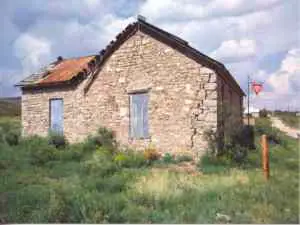
Lake Valley
Courtesy Bill Yanneck
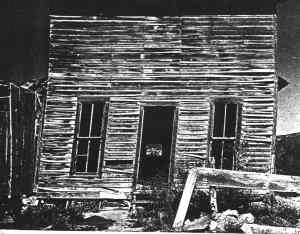
Lake Valley
Courtesy Samuel W. McWhorter
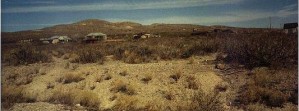
Lake Valley
Courtesy Bobby Zlatevski

Mine Entrance
Courtesy Bobbye and Speedy Drake
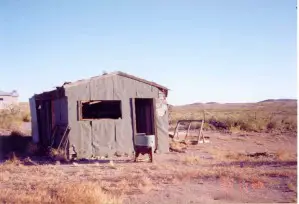
Tar Paper House
Courtesy Bobbye and Speedy Drake
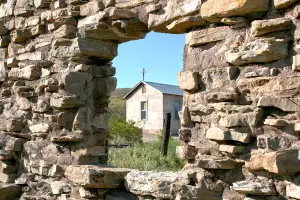
One of the town's three churches is viewed through the window of a stone building's ruins; August 2007.
Courtesy Ray Bales
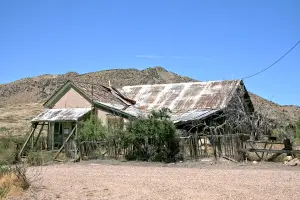
The ruins of the Nowlin House.
Courtesy Ray Bales
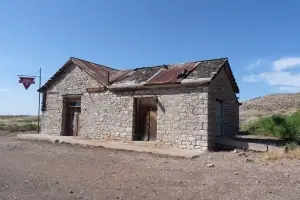
Old saloon-general store-gas station
Courtesy Andy Barrett
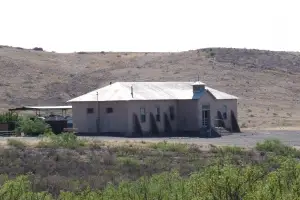
The school, which can be toured
Courtesy Andy Barrett
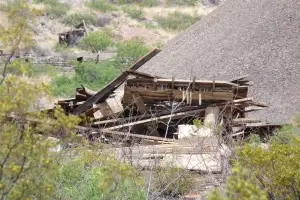
Railroad depot - the caretaker said a high wind blew down the depo in December of 2008
Courtesy Andy Barrett
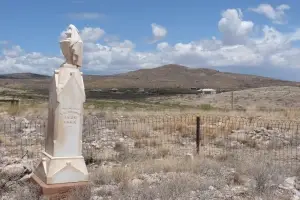
View of Lake Valley from the cemetery
Courtesy Andy Barrett
|